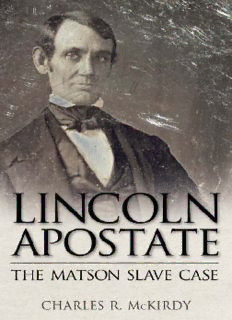
Lincoln Apostate: The Matson Slave Case PDF
Preview Lincoln Apostate: The Matson Slave Case
LINCOLN APOSTATE This page intentionally left blank LINCOLN APOSTATE THE MATSON SLAVE TRIAL CHARLES R. McKIRDY university press of mississippi / jackson www.upress.state.ms.us The University Press of Mississippi is a member of the Association of American University Presses. Copyright © 2011 by Charles R. McKirdy All rights reserved Manufactured in the United States of America First printing 2011 ∞ Library of Congress Cataloging-in-Publication Data McKirdy, Charles Robert, 1943– Lincoln apostate : the Matson slave case / Charles R. McKirdy. p. cm. Includes bibliographical references and index. ISBN 978-1-60473-985-5 (cloth : alk. paper) — ISBN 978-1-60473-987-9 (ebook : alk. paper) 1. Bryant, Jane—Trials, litigation, etc. 2. Matson, Robert. 1796–1859—Trials, litigation, etc. 3. Slavery—Illinois— Coles County—Legal status of slaves in free states—Cases. 4. Habeas corpus—Illinois—Coles County—Cases. 5. Lincoln, Abraham, 1809–1865—Career in law. I. Title. KF228.B778M38 2011 306.3’620977372—dc22 2010038782 British Library Cataloging-in-Publication Data available To my wife, Kathie, for forty wonderful reasons and still counting This page intentionally left blank CONTENTS acknowledgments . . . . . . . . . . . . . . . . ix introduction. . . . . . . . . . . . . . . . . . . . 3 chapter one A Dark Canvas . . . . . . . . . . . . . . . . . . . . . 6 chapter two The Initial Hearing . . . . . . . . . . . . . . . . . . . 20 chapter three The Lawyers—Lincoln . . . . . . . . . . . . . . . . . 32 chapter four The Lawyers—Ficklin, Constable, and Linder . . . 44 chapter five The Law . . . . . . . . . . . . . . . . . . . . . . . . . 57 chapter six The Trial . . . . . . . . . . . . . . . . . . . . . . . . 74 chapter seven The Coils of Friendship . . . . . . . . . . . . . . . . 87 post trial briefs. . . . . . . . . . . . . . . . . . 105 notes. . . . . . . . . . . . . . . . . . . . . . . . . . 114 index . . . . . . . . . . . . . . . . . . . . . . . . . . 167 This page intentionally left blank ACKNOWLEDGMENTS Writing a book is by nature a solitary pursuit, but one that I would have found impossible to do without “a little help from my friends.” I was lucky to have many. I start with the late Clarence Ver Steeg of Northwest- ern University, a truly remarkable man, who never stopped teaching me things worth learning. Then there is my sister, Agnes Greenhall, who took time off from her editorial duties at the New York Times to offer gentle suggestions, and Professor Gordon McKinney, who critiqued an early version of the book to the great benefit of the final product. I cannot say enough good things about Daniel R. Coquillette, professor of law at Boston College Law School and scholar ex- traordinaire, whose gracious encouragement made anything seem possible. Like all who write about the past, I owe a debt to people whom I have never met—those historians who came before me and lit a path to guide my way. That indebtedness extends as well to the librarians of the Library of Congress, the Abraham Lincoln Presidential Library, the Chicago Historical Society, North- western University, the University of San Diego Law School, the University of California at San Diego, and the Rancho Bernardo branch of the San Diego Public Library. So too to those enthusiastic yet careful part-time local and family historians, epitomized by Dorothy Burditt, Linda Kern Moore, Carol Doward, and Kit Zinser, whose research about ordinary people often gives con- text and dimension to the study of the lives of extraordinary ones. Patient, professional, and good-humored, Craig W. Gill, editor-in-chief of the University Press of Mississippi, along with his staff, deftly guided me through the editorial process. Finally, I must thank my family and friends who lived with this project for a long time and, although doubtlessly weary of it, never let on, not even once. ix
Description: